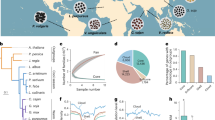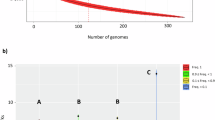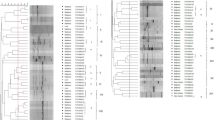Abstract
Lotononis bainesii Baker is a pasture legume introduced into Australia from South Africa. It has grown well on the sandy soils of the high rainfall areas of south-east Queensland1 and it has a highly specific Rhizobium requirement2. As an initial step in a genetic investigation of this plant, the breeding system and the chromosome complement have been investigated.
This is a preview of subscription content, access via your institution
Access options
Subscribe to this journal
Receive 51 print issues and online access
$199.00 per year
only $3.90 per issue
Buy this article
- Purchase on SpringerLink
- Instant access to full article PDF
Prices may be subject to local taxes which are calculated during checkout
Similar content being viewed by others
References
Bryan, W. W., Austral. J. Exp. Agric. and Animal Husb., 1, 3 (1961).
Norris, D. O., Austral. J. Agric. Res., 9, 629 (1958).
Darlington, C. D., and Wylie, A. P., Chromosome Atlas of Flowering Plants, second ed. (1955).
Senn, H. A., Biblio. Genet., 12, 175 (1938).
Author information
Authors and Affiliations
Rights and permissions
About this article
Cite this article
BYTH, D. Breeding System and Chromosome Number in Lotononis bainesii Baker. Nature 202, 830 (1964). https://doi.org/10.1038/202830a0
Issue date:
DOI: https://doi.org/10.1038/202830a0



